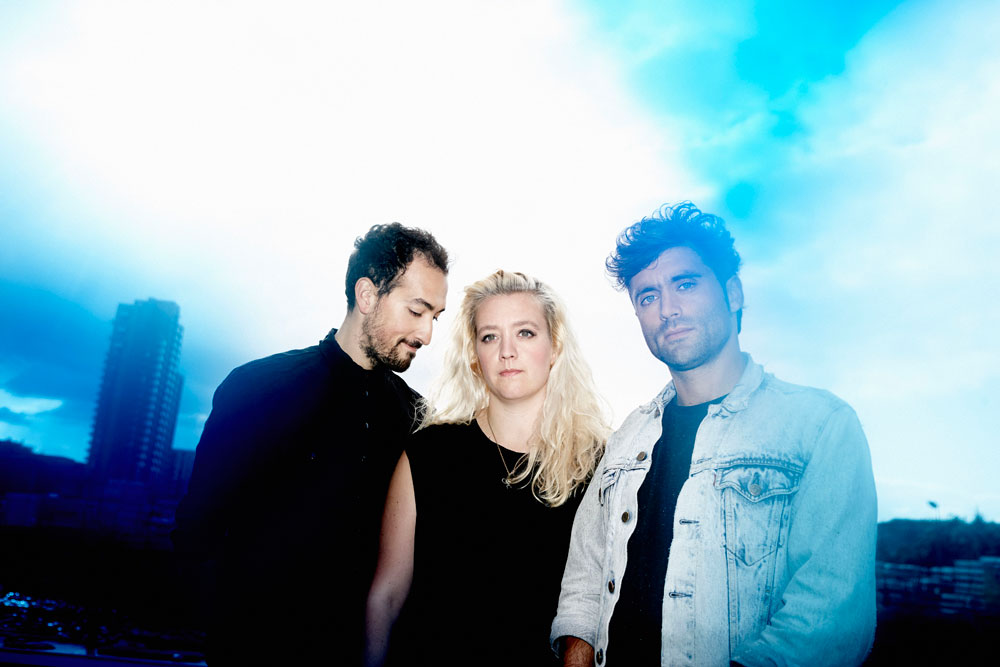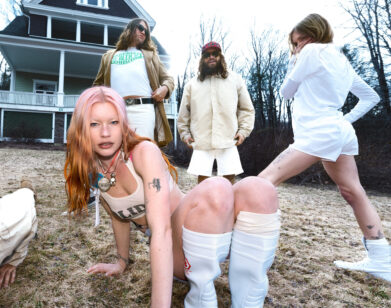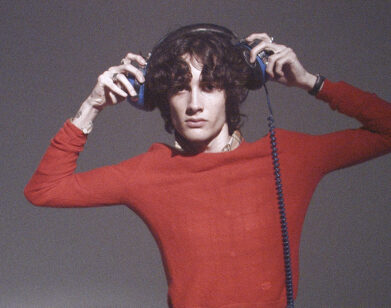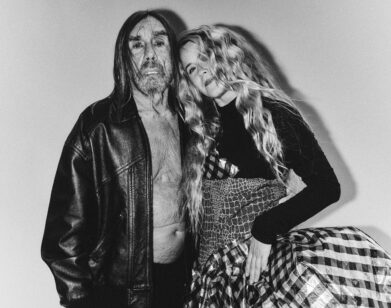All All We Are Is

ABOVE: ALL WE ARE. PHOTO BY DAVID EDWARDS.
One song blending smoothly into another, Liverpool-based band All We Are refers to themselves as “the Bee Gees on Diazepam” and their self-titled debut album is on par. The 12-track record, which was produced by none other than Dan Carey (Oh Land, Bloc Party, Yeasayer, The Kills), can be put on repeat as you drift in and out of daydreams. The 40-second “Intro” leads to three consecutive tracks that verge on five minutes (“Ebb/Flow,” “Stone,” “Feel Safe”), all of which lend themselves to All We Are’s genre-blending sound. Tempting comparisons at first might include the xx or Beach House, but with more edge. That edge, however, is far from sharp cuts or harsh transitions. Rather, soft and at times falsetto vocals from Guro Gikling and Luis Santos pair with Gikling’s underlying bass, Santos’s experimental and looped guitar hooks, and Richard O’Flynn’s movement-inducing drums to create songs that can slant toward R&B, funk, and rock.
Gikling, Santos, and Flynn, who hail from Norway, Brazil, and Ireland respectively, first met while attending university at the Liverpool Institute for Performing Arts, only forming the band following graduation. “We were all really young and [LISPA] was the only vessel with which we could move and get involved in the U.K. scene,” O’Flynn says. Although the three friends officially came together as a band in 2011 and have released multiple EPs as well as singles, it wasn’t until recently that they established what they now consider their sound. We spoke with the band over the phone before the release of All We Are, which came out on February 2 via Domino Records. We were in New York; they were in London.
RICHARD O’FLYNN: What time is it over there?
EMILY MCDERMOTT: It is 1:00 in the afternoon. It’s 6:00pm for you, right?
O’FLYNN: Exactly.
MCDERMOTT: And you’re playing a show tonight?
O’FLYNN: It’s a private show for a company called PRS, they are the guys who collect the royalties.
MCDERMOTT: That’s nice. It’ll be a small show then?
SANTOS: Yeah, it’s just like 120 people, invite only. Free booze.
MCDERMOTT: You can’t say no to that, right?
SANTOS: [all laugh] Exactly. First things first.
MCDERMOTT: So you’re in London for the show. You have your debut album coming up after a few EPs. How does it feel to finally release a full-length album?
O’FLYNN: We’re really excited. With the EPs and stuff that came before, there was a lot of finding our feet and finding our sound. We self-released a single a year and a half ago called “Utmost Good.” It was after that that we got in touch with Domino, so we really see that single as the start of our story—from that single, signing to Domino [in] December 2013, and then going pretty much straight into the studio. It’s all been really quick.
MCDERMOTT: What was the process like finding your sound?
GURO GIKLING: We’re a very jamming band; we spend all the time we have just jamming. We kind of hit on it when we were in this really good jam. We thought, “You know what? This is really cool. Let’s continue down this road and see what happens,” and that’s what we did.
MCDERMOTT: When did you first meet at Liverpool Institute for Performing Arts?
O’FLYNN: We met at university a couple years ago, but we didn’t actually start the band until after university. The first jamming sessions were really weird because we had to take up different instruments—like we were all guitarists initially and then we really wanted to start a band together so we had to do some changes. Luis was the best at guitar, so he got to stick with guitar. Then Guro picked up the bass and I picked up the drums. So starting off initially it was quite weird. We did have a lot of feet finding until we discovered our sounds.
SANTOS: I think it was always quite natural and organic, the way we ended up sounding the way we do. It wasn’t exactly a unique moment. We feel good about our sound now, but it happened as a natural progression. That’s the way it’s supposed to be. We’re not necessarily trying to write songs in one particular style or follow a specific light.
MCDERMOTT: So what made you want to go from just being friends to a band?
GIKLING: It was the only thing we’re good at really, making music. [laughs] We wanted to stay together and be in Liverpool because Liverpool is a really great place. The best way of doing that was to start a band, so we did.
MCDERMOTT: Guro and Rich, had you ever played instruments other than guitar? What was it like having to learn new instruments from scratch?
GIKLING: We all played loads of instruments, [so] we could find our ways in different instruments. When I picked up the bass and started playing, I found it difficult to sing and play at the same time because it’s so different than what it is to play the guitar and sing—the timing and stuff. It was a bit awkward to begin with, but I think I’ve nailed it now. I’ve found my way.
O’FLYNN: For the drums, I play a really weird style. I stand when I play. It comes from when we first went on tour: we didn’t have any room in the car for a drum kit, so I used to play with a tom, a snare, and a crush. I would stand up and play really, really simple beats. For me, it was a learning process, it happened really slowly over a period of time. It wasn’t a sudden change.
SANTOS: And I want to speak about guitar as well. [all laugh] I think I had sung live once before this band in all my years as a musician. So for me it was a big step, actually, to start singing on stage. It’s something I quite enjoy and I started experimenting with a lot of different pedals and hooking up loads of different things and getting unusual sounds. It was a big turning point for me as well.
GIKLING: I think we have quite a big sound for just being three people. I think a lot of people get quite amazed by that, that we actually create all these noises live.
MCDERMOTT: I was definitely impressed when I realized you didn’t use any computers or keyboard.
O’FLYNN: It’s really organic. The gigs are never the same every time. We can extend bits depending on what the vibe is. Like if we’re really vibin’ it and the crowd is really going for it, we can just improvise. And Luis builds a lot of guitar loops live. It’s nice not to be tied to a backing track or anything like that.
MCDERMOTT: Do you do a lot of improvisation during shows?
O’FLYNN: In a couple of tunes. A lot of them are quite tight—not regimented, but you know, have a certain light—but there are other tunes that we can really go for and if we’re really enjoying it we can just keep doing it.
MCDERMOTT: What are some of those songs?
O’FLYNN: “Stone” and “Go.“
GIKLING: And “Something About You.”
O’FLYNN: Yeah, “Something About You.” We kind of just play around. It can be quite atmospheric, some of the stuff. There’s loads of layers going on. They’re never the same.
GIKLING: They’re “feel the moment” songs and you never know really what’s going to happen. Luis, he plays guitar backwards. [all laugh]
SANTOS: You know, backwards from the end.
GIKLING: So we barely know what it’s going to sound like. Sometimes it sounds brilliant. Other times it’s…
SANTOS: It’s just goofy. [laughs]
GIKLING: We just have to feel it.
MCDERMOTT: I know you refer to yourself as the Bee Gees on Diazepam and I’ve also read that you draw inspiration from people like Frank Ocean, TV On The Radio, Bon Iver, and Outkast, which is kind of all over the place. What have you listened to recently that has been influential?
O’FLYNN: As you said, we have loads of different influences, but I think the things that really speaks to us are hip-hop, soul, disco and boogie, and anything with heart that makes you want to move. Personally, with hip-hop, I think I’m really inspired by hip-hop sounding grooves, like kick snare and that sort of stuff. I try to keep the beats quite minimal, almost like a drum machine. I think we have a common love of anything with soul.
MCDERMOTT: So you each have your individual tastes and you bring together these different influences?
SANTOS: I think there’s an element to that, but we have a lot of common ground as well. For me, I like a lot of Brazilian stuff so a lot of those sentiments we carry in my guitar.
O’FLYNN: It’s quite mournful.
SANTOS: Yeah, it is. But we have a lot of common ground as well.
MCDERMOTT: What are some of the different and some of the common influences?
GIKLING: I have a huge love for Joni Mitchell, and I think I’m the only one. I really love her, and I think she’s brilliant. I often listen to Joni Mitchell by myself.
SANTOS: The common ground is those bands you spoke of—we all really love them.
MCDERMOTT: You just signed with Domino Records last year, so are the songs from the album all new songs?
O’FLYNN: The songs, all but one tune, are all really new. We spent a lot of time finding our sound, but we ended up ditching our previous tunes when we learned there was an album deal in the cards. The three of us went off to Wales, which is quite a nice part of the U.K. We rented a cottage out there for a couple of weeks and wrote a lot of tunes and focused on getting new stuff together.
GIKLING: We got chased out of a few fields.
O’FLYNN: It was pretty cool. I think “Ebb/Flow” was the oldest one and the rest of them are all really new.
MCDERMOTT: What’s the process like for you when you’re writing songs? Do you jam like you said and then write lyrics afterwards?
O’FLYNN: We all just jam in a room, and we’ll jam for hours. These ideas, melodic ideas and grooves, will form and then lyrical ideas will come out. It’s all quite natural; it appears out of the ether. We write our lyrics together as well. It’s not as difficult as it seems. We just jam for ages and muck around with ideas and it just sort of appears out of nowhere.
SANTOS: We try to be quite open to suggestions as much as we can be. Some of my guitar lines might not necessarily be….and then somebody else’s idea, “try that,” and vice versa. That happens all the time. We steer the group into a direction.
MCDERMOTT: Is there one song you can point to that you wrote while you were in this cabin that was inspired from a specific thing that happened?
GIKLING: “Keep Me Alive” is the main tune from that session. It captures that whole loneliness of us in this cabin in a very, very All We Are world.
MCDERMOTT: You’re from Brazil, Norway, and Ireland. What was one of the first shows, or something that you did in Liverpool, that reinforced your being there?
O’FLYNN: I remember after university, before we formed the band, this club had opened. It was just starting to come into prominence and was called the Kazimier. Subsequently, we’ve become really good friends with the people who own it. They are self-sufficient and put on these incredible, intricate, artistic shows. I remember the first time I went there it felt really special. That was one of the times I thought, “I want to stay here and get involved in this scene.”
SANTOS: A lot of people leave that place after they leave university. For us, we ended up staying and are quite happy we stayed and became part of that scene. It’s a very important scene in the U.K. right now. There are a lot of really good artists coming from there, they all collaborate and know each other and hang around. It’s a very small place; the city center is a very concentrated area.
MCDERMOTT: I also read that you recorded your EP in a church and school, but then you did this in a studio. What was that like, switching from such a natural environment to a formal environment?
O’FLYNN: That was one of our first EPs I think. We basically did it ourselves, self-recorded and produced it. We really utilized the reverbs and stuff. Insofar as going into a formal environment, we recorded [All We Are] with Dan Carey, and his studio is downstairs in his house. It’s kind of a cave of synths and drum machines. The control room is the same room as the live room. It’s a really great atmosphere, really productive, but not very formal at all. It really suited us recording the album. It didn’t feel as formal, it felt natural and atmospheric and vibey, and we were all very much loving every minute of it and in the moment.
GIKLING: I think that’s why we went in to record an album with Dan Carey as well, because he’s this king of vibe and he really tapped into the relationship we have between each other when we play. He just really got it, and he got the best out of us while we were tracking.
MCDERMOTT: Outside of music, where do you look for inspiration?
SANTOS: Films and books. When we went to the cabin we took a projector with us and we were projecting loads of different films. That influenced our writing process in that particular moment where we just projected films on the ceiling and just jammed away.
MCDERMOTT: What were some of the films you projected?
O’FLYNN: The 1930s King Kong, 2001: A Space Odyssey. We did a Russian film called Shadows of Forgotten Ancestors, which was really bad.
GIKLING: A lot of Quentin Tarantino!
O’FLYNN: Enter the Void. A lot of weird, different stuff. Some were quite commercial and some were really obscure.
MCDERMOTT: A really eclectic mix.
O’FLYNN: Yeah. I loved this Czech film. What was that Czech film?
SANTOS: It was a film by a Czech director who does some really amazing stop motions.
GIKLING: A lot of things I hadn’t seen. It really scared me.
O’FLYNN: Yeah, it’s really creepy. They used real stuffed animals, like dead creatures.
GIKLING: Like anybody who hears the story of Alice In Wonderland…it’s really just creepy.
O’FLYNN: We demoed a lot of tracks down there. We used the audio from the films to mix into the demos. In some of cases, it really worked. It was wicked, quite cool.
MCDERMOTT: What were some of the films that you mixed in?
O’FLYNN: I think [Shadows of Forgotten Ancestors] was the one where it really worked.
SANTOS: Yeah, there was a lot of serendipity. Something happened in the film that’s really intense and it comes out from the whole sound and comes from that song. The way your brain makes connections and listens to different things—things that were never meant to be together, your brain often manages to connect them in a really cool way.
FOR MORE INFORMATION ON THE BAND, VISIT THEIR FACEBOOK.






